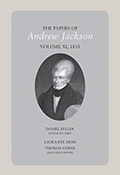The Papers of Andrew Jackson, Volume 11, 1833

- Author(s): Feller, Daniel, editor
- Series: Papers of Andrew Jackson
- Imprint: University of Tennessee Press
- Publication Date: 2020-03-02
- Status: Active
- Available in Hardcover - Cloth: Price $110.00 | Buy Now
- Leaf eReader required for PDF ebooks
This volume presents full annotated text of five hundred documents from Andrew Jackson’s fifth presidential year. They include his private memoranda, intimate family letters, presidential message drafts, and correspondence with government and military officers, diplomats, Indian leaders, political friends and foes, and citizens throughout the country.
The year 1833 began with a crisis in South Carolina, where a state convention had declared the federal tariff law null and void and pledged resistance by armed force if necessary. Jackson countered by rallying public opinion against the nullifiers, quietly positioning troops and warships, and procuring a “force bill” from Congress to compel collection of customs duties. The episode ended peaceably after South Carolina accepted a compromise tariff devised by Jackson’s arch-rival Henry Clay. But Clay’s surprise cooperation with South Carolina’s John C. Calhoun foretold a new opposition coalition against Jackson.
With nullification checked, Jackson embarked in June on a triumphal tour to cement his newfound popularity in the North. Ecstatic crowds greeted him in Philadelphia, New York, and Boston, and Harvard awarded him a degree. But Jackson’s fragile health broke under the strain, forcing him to cut the tour short.
Meanwhile Jackson pursued his campaign against the Bank of the United States, whose recharter he had vetoed in 1832. Charging the Bank with political meddling and corruption, Jackson determined to cripple it by removing federal deposits to state banks. But Treasury secretary William John Duane refused either to give the necessary order or resign. In September Jackson dismissed him and installed Roger Taney to implement the removal. Jackson’s bold assumption of authority energized supporters but outraged opponents, prompting Clay to introduce a Senate resolution of censure.
The year closed with Jackson girding for further battle over the Bank, pursuing schemes to pry the province of Texas loose from Mexico, and trying to stem rampant land frauds that his own Indian removal policy had unleashed against Creek Indians in Alabama. Unfolding these stories and many more, this volume offers an incomparable window into Andrew Jackson, his presidency, and America itself in 1833.
